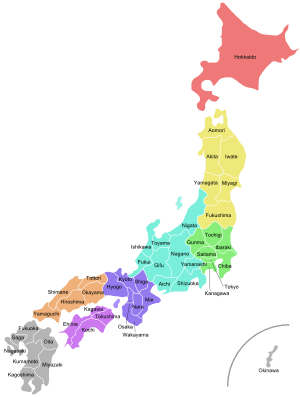Prefectures of Japan facts for kids
Prefectures of Japan (都道府県, todōfuken) are like the states or provinces of Japan. They are the 47 main areas that Japan is divided into. Prefectures are bigger than cities, towns, and villages, and they have their own local governments.
Contents
History of Prefectures
Japan's prefectures were created between 1876 and 1879. Before that, Japan was divided into older areas called provinces. The new prefecture system helped to modernize the country.
The Japanese word for prefecture, todōfuken, is a mix of the different types of prefectures:
- -to (都): This means "metropolis" or a very large city. There is only one, Tokyo (東京都, Tōkyōto).
- -dō (道): This means "circuit" or a large region. There is only one, Hokkaidō (北海道, Hokkaidō).
- -fu (府): This means "city prefecture." There are two: Osaka (大阪府, Ōsakafu) and Kyoto (京都府, Kyōtofu).
- -ken (県): This is the most common type. There are 43 other prefectures that end with -ken.
Even though they have different names, all these types of prefectures work pretty much the same way today.
Japan's Prefectures and Regions
Japan's 47 prefectures are often grouped into nine larger regions. These regions are not official government bodies, and they don't have elected leaders. However, people often use these regions to talk about different parts of Japan.
The way prefectures are listed below follows a traditional order, going from north to south. This order is also used in Japan's international codes (ISO).
Prefectures by Region
|
|
|
|
Okinawa is made up of islands southwest of the main island of Kyushu. It is often considered part of the Kyūshū region. However, the Japanese government sometimes sees Okinawa as its own region in newer ways of dividing the country.
See also
 In Spanish: Prefecturas de Japón para niños
In Spanish: Prefecturas de Japón para niños
Related pages
- Steiner, Kurt. (1965). Local Government in Japan. Stanford: Stanford University Press. OCLC 250059672
- Japan Mint. Japan 47 Prefectures Coin Program
 | Stephanie Wilson |
 | Charles Bolden |
 | Ronald McNair |
 | Frederick D. Gregory |


